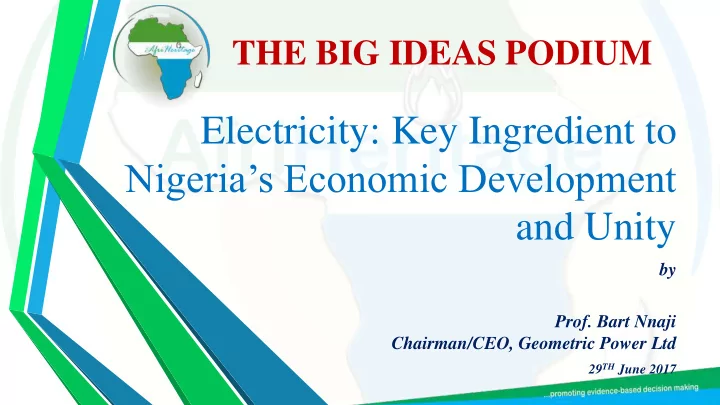

THE BIG IDEAS PODIUM Electricity: Key Ingredient to Nigeria’s Economic Development and Unity by Prof. Bart Nnaji Chairman/CEO, Geometric Power Ltd 29 TH June 2017
THE BIG IDEA: • Electric Power is a primary ingredient to Economic Development and Economic Development leads to Unity HOW? • Electricity is pervading in all aspects of economic development • When the country is economically buoyant, people guard the economic state of the nation and are less prone to cause instability; • Economic growth leads to positive interaction among all ethnic groups and this leads to unity
STATE OF POWER IN NIGERIA • Quantum: Installed, available, on-grid. • Genco suppliers: Privatized Gencos, IOCs, IPPs, NIPPs. • Transmission status. • DisCO status. • Gas supply and transport situation. • Other sources of power: renewables, and coal. EARLY THIS MONTH, AFRICA ENERGY FORUM IN COPENHAGEN, DENMARK • Over 2000 participants from all over the world. • Panel specific on Nigeria power sector: discussion on how to improve Transmission and DisCO. • The overall judgment of investors is that Nigeria is not a conducive environment for investment.
REASONS • Cost reflective tariff in power sector. • Gas constraint. • Transmission constraint. • Credit-worthiness of DisCO. • Over-leveraged power assets. • Value-chain misalignment. • Lack of commercial knowledge of the government functionaries. • Lack of will to enforce contracts, laws and policies. LETS LOOK AT EACH ISSUE • Cost-reflective tariff in power sector. Nigeria’s tariff position in Africa. Power procurement is by open book policy not portfolio mgt. Cost of darkness infinite/cost of power finite. Willingness to pay: pay for service. Tariff should quickly reflects currency adjustments and other market shifts.
REASONS • Gas constraint Nigeria has one of the largest deposits of gas in the world. Lack of adequate molecule availability. Lack of adequate gas transport infrastructure. Non-payment at the beginning of the value-chain impedes all other developments. PIGB can help but payment at DisCO is critical. • Transmission constraint National network has challenges if country does not have the funds. Breaking the Transmission into smaller inter- connected grids . Concessioning of smaller grids on a BT or Build Operate Trans basis.
REASONS • Over-leveraged power assets DisCO cannot invest in current situation – new equity investors. • Value-chain misalignment Revenue alignment to ensure that entire value-chain is performing. • Lack of commercial knowledge of the government functionaries Agencies should be populated with people who have real verifiable experience. Relevant Government Agencies’ development of human capital and attraction of knowledgeable, experienced and well-exposed personnel that understand global commercial and legal issues inherent in the power sector. • Lack of will to enforce contracts, laws and policies Political WILL is most critical: this is how all the sectorial challenges can be addressed. Sensitivity of Government agencies to private sector time and efficient management of costs in project development. Stable and transparent policies. Respect of contracts/agreements.
ELECTRIC POWER AND DEVELOPMENT • Even in the bible, God said: Let there be light • All modern equipment need some form of energy to work Household appliances. Industrial equipment. Modern rail, and other major transport systems. Charging of phones, battery powered cars, and numerous devices etc. • Need reliable and quality power for Hospital equipment operation. Manufacturing of sensitive products that require continuous process. Consistent quality production of most products: eg. shoe mfg etc.
ELECTRIC POWER AND DEVELOPMENT • Nigeria and comparable nations World: USA, China, India. African nations: South Africa, Ghana. Brazil: population, electricity generation, GDP. • What Nigeria should aspire to in electric power: Gas supply, GenCo, Transmission, DisCO, Market, Quality, reliability, completely aligned and incentivized value-chain. Govt. functionaries stopping toll gating, personal interest mgt, thinking big picture.
PERCENTAGE OF AFRICAN BUSINESSES FACING MAJOR OR SEVERE CONSTRAINTS Adapted from IEG (2014) in CDC Report 2016 60% 51% 50% 45% 38% 37% 40% 36% 30% 20% 10% 0% Power Finance Informality Corruption Tax Rate
SUMMARY • Electricity is a primary ingredient for industrialization and economic growth • Electricity is all pervading in economy • Electricity leads to economic growth • Economic growth leads to stability of the nation • Economic growth and stability lead to unity.
Recommend
More recommend